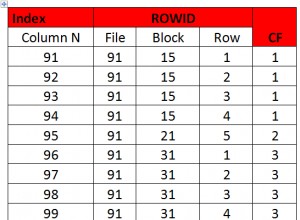L'idée est de créer d'abord une liste de dates uniques à partir des deux tables. Ensuite, pour chacune de ces dates, recherchez la date suivante (dans ce cas particulier, les dates sont regroupées par état, district, et la prochaine date est recherchée pour un état, un district particulier).
Nous avons donc maintenant la liste des plages que nous recherchons. Maintenant, nous pouvons joindre (pour cette tâche particulière jointure gauche) d'autres tables selon les conditions requises :
select
r.state,
c.start_cong,
c.end_cong,
c.party,
coalesce(c.district, d.district) district,
d.start_dist,
d.end_dist,
start_comb,
end_comb,
case when d.district is not null then start_comb end final_start,
case when d.district is not null then end_comb end final_end
from (
with dates as (
select
*
from (
SELECT
c.state,
c.district,
start_cong date
FROM congressperson c
union
SELECT
c.state,
c.district,
end_cong
FROM congressperson c
union
SELECT
d.state,
d.district,
start_dist
FROM district d
union
SELECT
d.state,
d.district,
end_dist
FROM district d
) DATES
group by
state,
district,
date
order by
state,
district,
date
)
select
dates.state,
dates.district,
dates.date start_comb,
(select
d.date
from
dates d
where
d.state = dates.state and
d.district = dates.district and
d.date > dates.date
order by
d.date
limit 1
) end_comb
from
dates) r
left join congressperson c on
c.state = r.state and
c.district = r.district and
start_comb between c.start_cong and c.end_cong and
end_comb between c.start_cong and c.end_cong
left join district d on
d.state = r.state and
d.district = r.district and
start_comb between d.start_dist and d.end_dist and
end_comb between d.start_dist and d.end_dist
where
end_comb is not null
order by
r.state, coalesce(c.district, d.district), start_comb, end_comb, start_cong, end_cong




